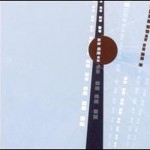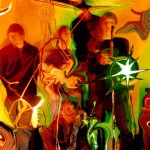All Girl Summer Fun Band
 2
2
K Records
The Donna’s these women ain‘t, but the Soft Donnas, maybe. And perhaps, in some ways (thematically), they are the anti-Sleater-Kinney (while sounding a little bit like them, at the same time). But, whatever the case, AGSFB are definitely a kick, in a Jane Weidlin-fronting-the-Go Gos sort of way- though this band is a lot more sarcastic and not nearly so stuck on themselves. ‘50s and ‘60s girl-group harmonies echo through several songs on this, their second album for K Records. Nothing groundbreaking here, but it it’s all consistently entertaining and- well- fun.
Guitarist vocalist Jen Sbragia was performing in the popular duo, the Softies, with ex-Tiger Trap guitarist/vocalist Rose Melberg, when she was approached by guitarist/vocalist Kim Baxter, who gave Sbragia a tape of songs upon which she had been working. Sbragia was impressed with Baxter’s songs. She contacted Baxter, who mentioned that she had several musically like-minded friends. Among those friends was Kathy Foster, who plays drums, bass, guitar and sings, and who had already found success as a member of the Sub-Pop band the Thermals, with Hutch Harris, as well as in the duo Hutch and Kathy. Another of Baxter’s friends, bassist/drummer/vocalist Ari Douangpanya, became the fourth member, and the band was born.
A little over a year ago, they released their first, self-titled album. Now they’re back, bigger and badder (and a little more electric) than last time, with fourteen new songs, which manage to capture the essence of “girl groups,” going back to the ‘50s, to such acts as the Bobbettes, the Caravelles and Patience and Prudence, through the ‘60s, the Ronettes and the Shirelles, to the present. As previously stated, as a band, these women don’t rock as hard as the Donnas, but in reality, AGSFB are far closer to the musical tradition of “girl groups” than the Donnas will ever be.
The album starts off with “Dear Mr. & Mrs. Troublemaker,” a song which begins with a spoken-word section (ostensibly, a typed letter to a boyfriend’s parents), reminiscent of the Shangri-las’ “Leader Of The Pack.” Soon enough, however, the song explodes into a power guitar number, more in line with Throwing Muses, the Slits, or, the aforementioned Tiger Trap. Cute. “Down South, Ten Hours, I-5” is a “band on the road” number, that’s also pretty cute, although it does not add a whole lot to the oeuvre.
If brevity is indeed the better part of wit, then “Ticking Timebomb,” coming in at 97 seconds in length, is pretty darn witty. It’s a standard complaint, lover-gone-wrong stuff, over a hard-driving surf beat. Briefer still is “Inarticulate,” clocking in at 86 seconds and vaguely based on an old, civil war melody. “Jason Lee” isn’t as brief, but it’s even wittier; while (indirectly) referring to the Bobbettes 1957 hit “Mr. Lee.” It’s a loving crush-song for the actor (Mallrats, Chasing Amy, Dogma, etc); a sporty march, along the lines of They Might Be Giants’ brilliant “Ana Ng.”
“Grizzly Bear” is distinctly Tanya Donelly-esque in nature, circa her Belly period. Light-hearted and a bit off-kilter, it’s a fine rocker with a double-time beat and a memorable guitar riff. Good stuff. Changing gears, “Daydreaming” is a dreamy number, with echoes of early U-2 in the rhythm section and eerie volume pedal guitar interjections. Meanwhile, “Video Game Heart” sounds like the Shangri-Las doing a Breeders song. Chunky, hard hitting guitars and punchy drums propel the song, as a fluttery synth part lends distinctive character to the arrangement.
“Million Things,” “Parallel Park” and “The Longer I Wait” share a similar world view (mostly concerned with being with the loved one and making out, etc) and (in the case of the first two, anyway) a penchant for infectious, cheerleader-like handclaps in the choruses and turns.
Baxter’s synth strings give “Samantha Secret Agent” a certain epic quality, in a song that could pass for Hunkpapa-era Throwing Muses, doing the title track for a G-rated spy flick. The chorus is catchy, but awfully repetitive. And the storyline within the song is especially elusive.
“Becky,” which starts out as a tender ballad, cuts across fifty years of rock ‘n’ roll girldom with razor-like precision. The key lyric is “Becky, I wanna borrow your boyfriend/‘Cause I know you don‘t really care/And it doesn‘t seem fair to me/I wanna borrow your boyfriend/‘Cause I‘ve got so much love inside/And you‘re just taking him for a ride.” Well, there it is. Eventually the song (predictably) erupts into punky surf over-drive, essentially destroying the true feel of the song, but hey, that’s rock ’n’ roll.
A driving beat and unison lead vocals, replete with “yeah, yeah’s,” recall the early Beatles, in “Tour Heart Throb.” The chorus sounds like it’s being sung by women who don’t speak English as their primary language. Think of Shonen Knife with subtitles. Until I looked at the title of the song, I thought the girls were singing “two hot dogs.” Anyway, it’s a funny song with a surprise twist in the lyrics, in the very last line.
This is real Power Puff stuff. The All Girl Summer Fun Band are almost great. They certainly play well enough, or nearly so. The lead guitar riffs, while somewhat primitive at this point, are bound to evolve. And the songs are all cleverly written, if at times incomplete. The addition of a keyboard in the mix on several songs adds depth and color.
What these songs lack, in several instances, is a good bridge. A bridge need not be more than a few lines, or a brief key change. But, a bridge can add a lot of space to a song and can break up any repetitious aspects of an otherwise very solid composition.
Secondly, some of these songs would benefit from different arrangements. Doing what is expected is not always the best choice for some songs. It might be interesting to think how Chrissie Hynde or Johnette Napolitano would approach a song like “Becky.” There is some real emotion in that song in particular, which is not fully explored here. Here we get what is expected.
Still, AGSFB fire on six-cylinders most of the time. And while they might lack a little power on the steeper grades and smoke a bit in traffic, they prove themselves to be a sturdy and dependable vehicle, road friendly and- rain or shine, it always starts right up.
Stereo Crush
 Like A Girlfriend
Like A Girlfriend
Self-Produced
This talented quartet has produced two albums and an EP in the past five years. This second EP marks substantial growth for the band. They recorded this five-song project at Kung Fu Bakery, with Tim Ellis serving as producer and Bob Stark acting as the engineer. And those world-class talents working behind the board have helped to flesh out the band’s sound, without sacrificing any of their power or spontaneity.
The band cites Afghan Whigs as an influence and that can be heard in vocalist/ guitarist Johnny Crash’s impassioned Greg Dulli-like vocals. Coupled with his fiery Rick McCollum-esque guitar attack. But Erik Stanfill’s keyboard approach is descended from those of Kilroy Was Here-period Styx and Moving Pictures/Signals-era Rush (think of “Tom Sawyer“). Other stylistic comparisons have been made between Stereo Crush and the Smiths and the Cure. There is some truth there too, although this band sounds more like Robert Smith fronting the Smiths or Morrissey fronting the Cure. And Bono fronting Joy Division is a component here too, it would seem.
Still Stereo Crush are not a retro band, despite the fact that Stanfill’s keyboard patches recall ‘80s staples: the analog Sequential Circuits Prophet 5 and the digital Yamaha DX-7 synthesizers. And Stereo Crush are not a copy band either. Instead they are the sum of their influences- sounding something like many, but exactly like none. Their material is intelligent, if not always intelligible. But, with this recording, they are certainly presented in their very best light and the consistent high quality of the material here reflects that fact.
Stanfill’s burbling, organ-like keyboard arpeggios squirt out against Crash’s brash, Neil Young-like guitar chords, over an F#m/D progression, on “Oxygen.” Crash’s passionate vocals utter important phrases: “And judgment calls/Smart bombs,” etc., whose apocalyptic imagery seems prophetically close to our current reality.
Bassist Benjamin Rickard maintains a lean, sparse bassline through the verses, over Daniel Vallejos’ robust beat. The chorus bursts forth briefly, with Crash’s doppler bomber guitar figure and Stanfill’s slippery, pitch-wheeled keyboard fills. Meanwhile, Rickard is allowed to play notes more frequently than once every four measures.
“Break In Two” follows, a song that could easily pass for Rob Thomas and Matchbox 20, except that Stereo Crush can really play their instruments and Stanfill’s orchestral synth-string flourishes seem way outside of Matchbox 20’s domain. Again, the arrangement is very spare, allowing for a spacious production- Rickard and Vallejo hold the song together, barely tethered together as Crash delivers the message. Stanfill’s Foreigner-ish keyboard installations in the chorus give this band a unique sound. Meanwhile a strong bridge helps to elevate this song well above the mundane.
Another brilliant arrangement distinguishes, “Promises In Sand.” Every instrument is given space to be heard, with no aural clutter, whatsoever. Crash’s frenetic guitar squawks drive the song, but other guitars- a whipsmart electric rhythm guitar, as well as a frothy acoustic guitar are in the mix, in various places. Stanfill adds understated organ pads, while Vallejos and Rickard provide most of the forward motion.
The title track is a moody number, with Crash’s vocal sounding like Styx’s original vocalist Dennis DeYoung singing over an instrumental arrangement that could pass for late ‘80s INXS. As the song progresses, a gathering reverberation of thick clouds, comprised of guitars and keys, begins to hover above rumbling bass and crashing drums. Emotively effective.
The music industry is currently in such lousy shape, that it would seem there is no one home at the majors to promote the sort of intelligent, well played, well recorded music that Stereo Crush are obviously capable of creating. There are a few other bands like this around Portland. And it’s a shame. They are all too good for the indie world of hit records: with sales of a couple thousand units. And the major labels so desperately don’t know what they want, that other media (such as the internet for instance) are now about the only means by which the public can know of these great bands. This is a fine album by four good musicians and a great production team.
Gravity and Henry
 Sputnik: Traveling Companions
Sputnik: Traveling Companions
Revolve Records
Gravity and Henry are a power duo of the highest order. Vocalist/guitarist Matt Sheehy and drummer extraordinaire, Jarhid Brown (who also adds background vocals) easily pass for the Police of the 21st century with this baker’s dozen of high quality songs, well-written, well-wrought and well-produced. Intelligent, impassioned and energetic, this pair overflows with ideas, with the inherent abilities to fully execute those ideas.
While not sounding particularly like anyone, Sheey and Brown call to mind ‘80s bands such as XTC, U2, Oingo Boingo and especially the Police, as well as more current acts such as Semisonic and its predecessor, Trip Shakespeare. But more so even than Scott Plouf’s contribution to the Spinanes, Brown’s awe-inspiring drum work integrally drives every song, with a Stewart Copeland-like authority. This is not to say that Sheehy is any slouch on guitar. With the benefit of multiple overdubs, their sound is thick and complex. These guys are way beyond competent. Having carved out a sound of their own, they explore a wide variety of musical forms.
Byrdsian vocal harmonies abound on “Trigger/Response,” a straight-ahead rocker. A Police-like interlude, reminiscent of “Everything She Does Is Magic” initiates “Full Minute Figure,” before the song evolves into a Big Head Todd and the Monsters sort of song: melodically earnest, emotionally subdued. Brown cuts through the ¾ time signature with incredible inventiveness, through to the intense conclusion.
Some strange time signatures twine through the tightly wound “March 4th,” creating a sense of foreboding and darkness, evocative of OK Computer period Radiohead. Brown’s ever-shifting, syncopated drum work, impacting like gunshots through the course of the song, machine gun fills and thunderous cannon vollies in the verses, lead the attack.
A droning, Middle Eastern flavored riff is the propulsion behind “Wellbutrin,” as Sheehy creates an Andy Partridge like mood with Who-like overtones, with his modal guitar intonations and brusque vocal assiduity. “Lullaby Song,” is a solemn march, with-banjo like guitar riverboats sailing on shimmering, watery percussion. “Shit For Laughing,” features angelic three-part harmonies and reverent vocals over an (eventually) hard-hitting drum fusilade. The middle section dissolves into rippling puddles of echo-generated sounds, swirling and eddying, slowly building back to the chorus. The Verve comes to mind on this song.
“Sinkful Of Rust” balances upon a moody piano setting and the relentless waltzing carousel of Brown’s drums, as Sheehy’s voice mournfully resonates upon a sad song- like a modern update of the Moody Blues’ “Nights In White Satin.”
Trip Shakespeare comes to mind in the soulful “Emergency Exit,” a rousing chant that ends abruptly, bursting like a bubble as the instrumental “The Apollo Room” begins, with chiming guitar harmonics ringing like bells on a crisp spring morning, as Sheehy wordlessly calls out across the musical countryside. The guitars build to a crescendo before the cycle repeats. A ghostly piano theme hovers against sputtering drums, giving way at the end, before the thread is picked up by the drums in the next song, “Objects Designed To Conserve Space.”
A churning beat, jagged chords and an off the cuff vocal are very XTC-ish. Brown’s relentless thrashing of the drums are the primary motivation on this, another mostly instrumental number. This gives way to “Kicking And Screaming,” a skittering contrapuntal jig, that spins deliciously in the inspired middle section. Incontrovertably powerful.
Another waltz, “New Spanish Dictionary,” is played fairly straight by Brown, who adds some nice jazz fills at the turns, but mostly sits back, in the dappled melancholy light cast forth by Sheehy’s death-spiraling guitar riff. “Backyard Epiphany” is a whirling satellite of a piece that briefly crosses the sky of one’s perception before blinking out of view.
As the band’s promo material points out, the Russian word sputnik means “traveling companion.” That is an apt sentiment for the explosive talents of Matt Sheehy and Jarhid Brown. Sheehy’s talent is especially admirable, as he is able to keep from being overshadowed by Brown’s truly incredible drum work.
It’s not clear if this band will be able to pull off a live show, using a computer as a third member. Bringing a real bass player on board, one with the same level of skills and competency as these two monster musicians demonstrate, would make of this band one of the best power trio’s anywhere, ever. While lyrically it is not clear what it is Sheehy has to say, he delivers his vocals with passion and conviction. And while there may not be any “hit singles” here, the music is always thought provoking and jaw-droppingly well executed. This is a great young band.
Precursor
 Precursor
Precursor
Self-Produced
Oh, it’s been over twenty years now since former Two Louies columnist Gary Aker infamously asked of the popular local hair band, “Sequel To What?” Admittedly, his was a cheap shot, but it brings to mind another question about another band, all this time later. Precursor to what? Now hear me out, I mean this in a good way. I think.
For, here is a fairly lo-fi recording of three songs, produced by an enterprising fivesome of like-minded young men, who, with a spit-and-bailing-wire approach, cobble together some very interesting music, which, at various times seems influenced by Zappa, the Stones, the Doors, Led Zeppelin, Afghan Whigs, Radiohead, Morphine, Blur, Offspring and Silverchair, to name but a few.
This is mood music- somewhat non-linear, at times very energetic and at others a little disoriented and discorporate. The musicians, vocalist/guitarist Andrew Munson, drummer Chad Noakes, bassist Scott Noakes, and guitarist Ryan McIntire present a sometimes dense sound. The addition of dj Jon Brennan to the mix adds an unique spin to the production, creating noir-ish contrasts and gritty textures. Sometimes the music strays from its musical point, as the band offers occasional soliloquies of gibberish. But, in many instances, they display real power in their performances, as well as real imagination.
Ocean sounds, a singular guitar and a falsetto voice lead us into “Black Widow,” before the song quickly gathers in intensity, if not in lucidity; raging thunderously, full of sound and fury. It’s not clear what it is, but it’s quite clear there’s a problem here. It all resolves in some pretty, but eerie falsetto vocals.
More of a straight-ahead rocker, “Psalms” rides upon a classic rock guitar riff and a vocal line that parallels that riff, sounding something like Supergrass at first, before the song becomes a Hives meets the Vines sort of hopped-up affair- with a spacey middle section. The apocalyptic ska of “Dead Man Walking” creates an energized atmosphere, with vocals that sound a lot like Mick Jagger fronting the Strokes.
Precursor’s somewhat reckless approach to DIY home recording suits their sometimes sloppy approach to their material. But this band is not without potential. The vocals are generally charismatic in an idiosyncratic sort of way. The guitars often deliver well-wrought pieces of exposition. All in all it seems that the band has real possibilities and is, most assuredly, a precursor to something!
